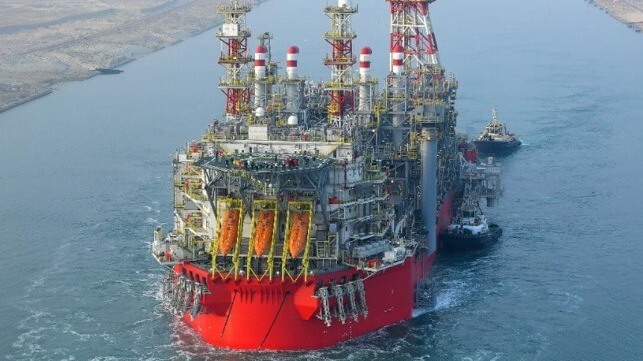Lebanon Disputes Israel's Right to Develop Karish Offshore Gas Field

The FPSO for Energean's Karish gas project has arrived in position near the boundary between Israeli and Lebanese waters, prompting angry warnings from Lebanon's political leaders about the impending development of the gas field.
Karish is located in a boundary area that has been the subject of convoluted negotiations in recent years. Israel insists that it is not disputed: Lebanon has never formally filed a maritime claim to the area surrounding Karish with the United Nations, and Israel does not recognize an ongoing boundary dispute at the site. However, in U.S.-mediated boundary negotiations, Lebanon has vaccilated over whether the area containing the Karish field is its own.
Lebanon and Israel have a longstanding disagreement over a wedge of EEZ measuring about 860 square kilometers on their maritime boundary line. During talks in late 2020, Lebanon sought to expand its EEZ claim to the south by another 1,430 square kilometers (its so-called Line 29 boundary claim), including half of the Karish field. During the period of deep political turmoil in Beirut, the Lebanese government never formally issued a decree to file the Line 29 claim with the United Nations.
In talks in February 2022, Lebanon retracted the Line 29 claim, retreating to its longtime boundary claim (Line 23). Now that Israel is poised to develop Karish, the Lebanese government has reversed course again and revived its Line 29 claim to the waters containing the field.
Israel denies that a dispute exists at the drill site, and says that it will take all necessary measures to protect the field's development, to include a naval deployment and the installation of a marinized version of the Iron Dome missile defense system.
“With its anchoring, the rig is located in Israeli territory, several kilometers south of the area over which negotiations are being conducted between the State of Israel and the Republic of Lebanon, mediated by the United States. The rig will not pump gas from the disputed territory," said Israeli Defense Minister Benny Gantz, Foreign Minister Yair Lapid and Energy Minister Karine Elharrar in a joint statement. “The State of Israel prioritizes the protection of its strategic assets, and is prepared to defend them and the security of its infrastructure, all in accordance with its rights."
On Sunday, Lebanese President Michel Aoun characterized the installation of the FPSO Energean Power as a "provocation and a hostile act." However, President Aoun has still not signed a decree to formally amend Lebanon's boundary out to Line 29 and lay claim to the Karish field, nor has he given a clear indication whether he will do so. This disconnect prompted Shiite terrorist group Hizbollah - Lebanon's most powerful political force - to call for policy clarification before launching any militant action against the new development.

that matters most
Get the latest maritime news delivered to your inbox daily.
"The issue requires a decisive decision from the Lebanese state,” Hizbollah official Sheikh Naim Qassem said, according to Reuters. "When the Lebanese state says that the Israelis are assaulting our waters and our oil, then we are ready to do our part in terms of pressure, deterrence and use of appropriate means—including force."
American diplomat Amos Hochstein, who has worked with Lebanese and Israeli negotiators before, is expected to return to the region early next week to mediate new talks between the two sides.
